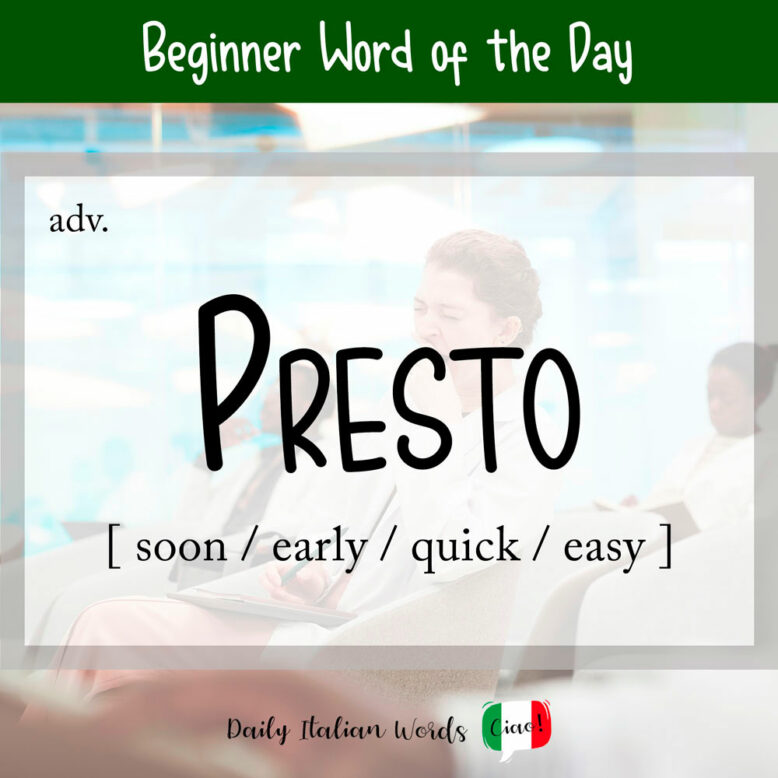There are four main ways to translate the Italian adverb presto into English: early and soon, which are the most common translations, and quick and easy. Let’s take a look at each translation now!

Presto = Early
One of the most common translations of presto is early. The opposite of the adverb tardi (late), it may also translate as ahead of schedule. Below are a few verbs that are often paired with presto when the meaning is early.
- alzarsi presto = to get up early
- svegliarsi presto = to wake up early
- arrivare presto = to arrive early
- partire presto = to leave early
Mi alzo presto al mattino.
I get up early in the morning.

Presto = Soon
When presto occurs in the following expressions, the meaning is soon rather than early.
- il più presto (possible) = as soon as possible
- presto o tardi = sooner or later
- ben presto = very soon
It also appears in the greetings A presto! (See you soon!), Ci vediamo presto! (We’ll see each other soon!), Ci sentiamo presto! (We’ll talk soon!) and Guarisci presto! (Get well soon!)
Sarò presto papà!
I’ll soon be a dad!

Some possible synonyms include fra poco, a breve or entro breve tempo. To say as soon as possible, you can also use the word prima (earlier): il prima possibile.
Presto = Quick
When Presto! is used on its own as an exclamation, it means Quick! It also assumes this meaning when paired with the verb fare (to do).
- Faccio presto! = I’ll be quick!
- Faccio il più presto possibile! = I’ll be as quick as possible!
Presto, chiama un’ambulanza!
Quick, call an ambulance!

Possible alternatives are veloce (quick) or in fretta (quick / quickly):
- Veloce, chiama un’ambulanza! = Quick, call an ambulance!
- Faccio in fretta! = I’ll be quick!
Presto = Easy
Presto translates as easy when it appears in the idiomatic phrase Si fa presto a… which means It’s easy to…
- Si fa presto a criticare. = It’s easy to criticise.
- Si fa presto a dire / fare… = It’s easy to say / do…
Si fa presto a fare amicizia con le persone quando si condivide la stessa passione.
It’s easy to make friends with people when you share the same passion.

Did you know that…?
The English expression Presto! (or Hey presto!), which magicians exclaim when announcing the successful completion of a magic trick, comes from the Italian presto.
Heather Broster is a graduate with honours in linguistics from the University of Western Ontario. She is an aspiring polyglot, proficient in English and Italian, as well as Japanese, Welsh, and French to varying degrees of fluency. Originally from Toronto, Heather has resided in various countries, notably Italy for a period of six years. Her primary focus lies in the fields of language acquisition, education, and bilingual instruction.


